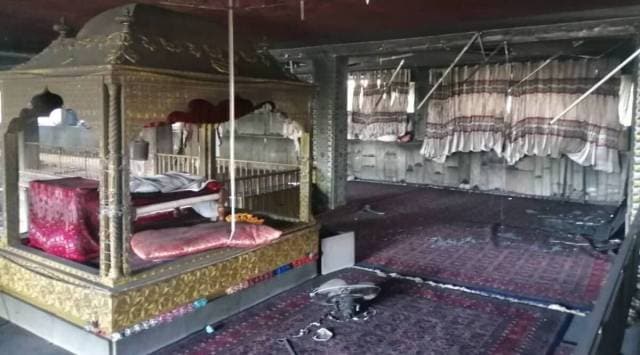A day after an Islamic State-claimed attack on one of the main gurdwaras in Kabul that killed two people and injured at least three, the Indian government granted visas to 111 Afghan Sikhs who wanted to come to the country.
Sources said the decision to grant the e-visas were taken within hours of the attack, which took place on Saturday when 25-30 Afghan Sikhs and Hindus had gathered at Gurdwara Dashmesh Pita Guru Gobind Singh Karte Parwan, the central gurdwara of the Afghan Sikh community in Kabul, for the ‘Sukhmani Sahib’ or morning prayers. A group of gunmen, believed to be around four in number, stormed the gurdwara and opened fire.

Sources said the Islamic State Khorasan Province (ISKP) claimed responsibility for the attack, and that the ISKP said the attack was in response to remarks made against the Prophet by two suspended BJP spokespersons.
The attack has also cast a shadow on the government’s plans to restart at least some of the functions of the Indian embassy in Kabul, such as visas, humanitarian help and trade in some sectors.
Sources said that while the intention to restart some of these services remain, a political call has to be taken.
Earlier this month, when an Indian team went to Kabul after more than nine months following the Taliban’s takeover of Afghanistan, it found that the health and education infrastructure in the country is crumbling. It, however, found that the security situation had shown some improvement.
This initial assessment had been shared with the top Indian leadership following the team’s visit.
Story continues below this ad
The team, led by a senior official from the Ministry of External Affairs, had met Taliban Foreign Minister Amir Khan Mottaqi and Taliban’s deputy foreign minister Sher Mohammad Abbas Stanekzai on June 2 and 3.
J P Singh, joint secretary in charge of Pakistan, Afghanistan and Iran in the MEA, had led the Indian team. In the past, he has met Taliban officials in Doha, Qatar. India closed its mission in Kabul soon after the Taliban entered the city last August.
The Indian team had also visited the Indian embassy premises in Kabul, and found that the premises were “safe and secure”. They also visited four projects and programmes which had some Indian role, and that was when it found that the country’s health and education facilities were in dire need of help.
They had visited the Indira Gandhi Institute of Child Health — a 400-bed hospital, which was the main hospital in Afghanistan that caters to children. The hospital lacked essential medicines, and key medical equipment were in need of repair. Most doctors have left the country, and the hospital is massively understaffed and under-equipped, the team found.
Story continues below this ad
They had also visited southwest Kabul’s Habibia High School, which was renovated by India between 2003 and 2005, and found that it too needed maintenance and help with upkeep. The school had some teachers and girl students were allowed only till primary classes, the Indian team found.
In their conversations with key Taliban leaders, the Indian team got a sense that the Taliban was “ready to engage” and was desperately looking for assistance to improve the country’s infrastructure. But they are facing challenges in governance and capacity, as many well-qualified and trained Afghan nationals have left the country.
One of the key and perceptive changes in Kabul was the general improvement of the security situation, where the Indian team got the sense that there was a perception of improved security.
However, Saturday’s attack has changed the threat perception for the Indian establishment in Afghanistan, despite assurances from the Taliban. Sources, however, said New Delhi is committed to the welfare of the people of Afghanistan, and will take measures in a “realistic manner”.









